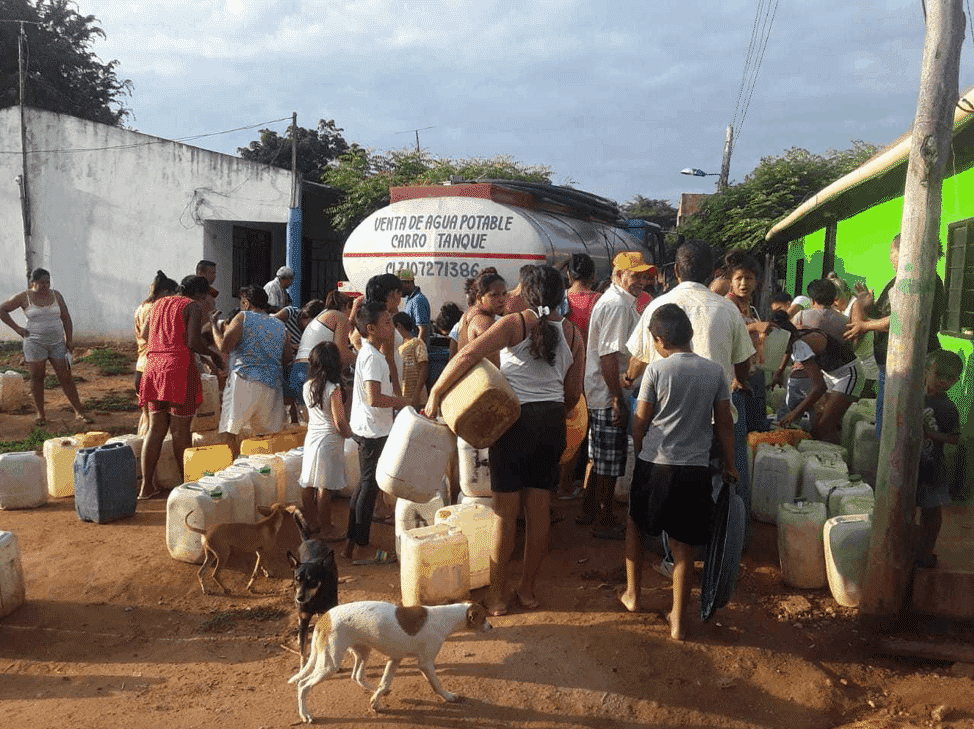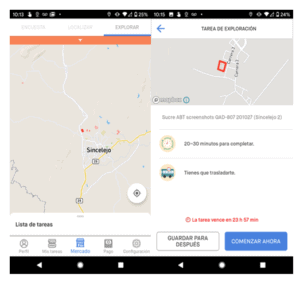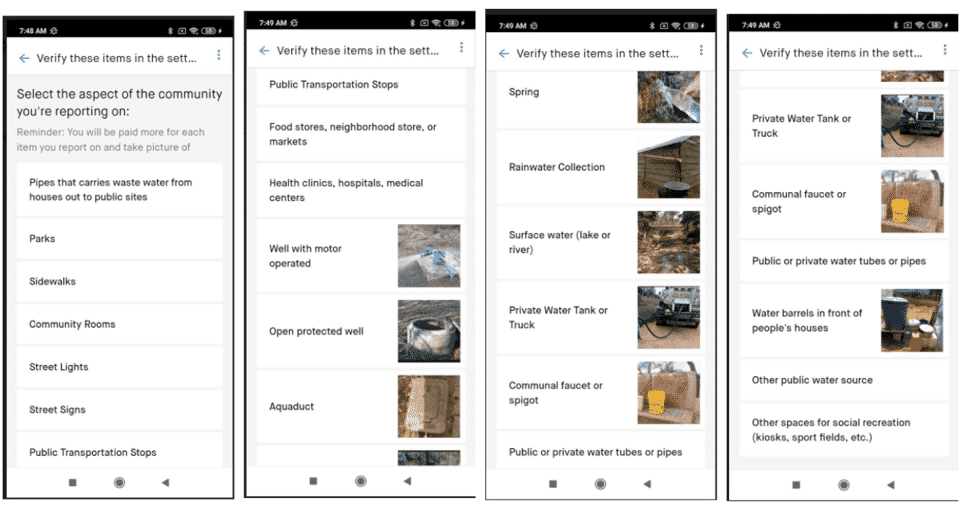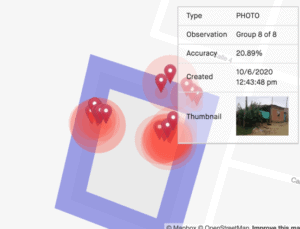Premise’s app empowers individuals around the world to become more engaged citizens. Through the app, our contributors can report key aspects of their community by answering survey questions, taking photos and geotagging locations in exchange for a payment. For the last couple of months, Premise has been crowdsourcing data and monitoring Venezuelan Settlements in Colombia to identify water and sanitation needs for USAID’s Bureau for Humanitarian Assistance.
Our partner, iMMAP, is using this data to coordinate aid with local humanitarian organizations.
“Over the past few months, with major restrictions imposed due to the spread of COVID 19, Premise has been vital for iMMAP to collect information on humanitarian needs throughout Colombia. Between mid-March and through August, our information management staff was immobilized and national flights and bus travel was prohibited. Fortunately Premise allowed iMMAP to collect information on needs directly in the local community. This information has facilitated an improved humanitarian response by identifying needs which otherwise may have not been observed due to limited humanitarian access.”
“In iMMAP we are making use of Premise for a variety of purposes. In our work with Venezuelan migrant settlements, Premise plays an important role in first helping to identify the affected communities to be targeted, and then in helping identify needs to be attended. There is much work yet to be done to effectively use Premise to target a more effective aid response, but it’s clear that without Premise’s information on a number of needs we would not have been available to responders in many cases”
– Jeffrey Villaveces, iMMAP Colombia Country Director
In mid-October, Premise Contributors in Colombia were completing monitoring tasks to identify water and sanitation needs in Venezuelan settlements. They arrived at a community in Sucre’s department and were able to identify that the location had been without water access for five days. Our contributors learned through the monitoring task this community typically collects water through rainwater or when they can afford it, through water trucks. But in the past week there hadn’t been any rain nor could the community afford a water truck. Our contributors decided to immediately take action and pay, entirely by themselves, for a water truck to distribute water to the community.
“From our experience in the settlement in Sincelejo, we became aware of the needs that people in this neighborhood face on a daily basis. Everyone has the right to live with dignity and this gesture of support was a demonstration of solidarity with this community.” – Katty Zúñiga, Premise Contributor
“We were filled with happiness and rejoiced at the ability to help these families that have many needs. In several tasks we have been able to give this type of personal and group support, leaving the name of the company we represent in the highest regard and giving hope to improve conditions in the communities we visit.” – David Suárez, Premise Contributor
“The work that we have undertaken in different areas and neighborhoods around Colombia has allowed us to better understand the real situation many families currently face. They lack essential services like water, electricity, and sanitary infrastructures. We hope that from the surveys that we have completed with Premise and their subsequent analysis, the organizations can understand the reality that these families face and improve their current living conditions.” – Yeiner Mena, Premise Contributor

Image of the water distribution to community members.
While we never ask our contributors to use their personal resources to help, we do love hearing stories that reflect the human side of Premise’s participants. On the project side, iMMAP’s Colombia team is able to use the data collected through the app and coordinate immediately with the humanitarian organizations in Colombia. They are currently working with the Health and WASH cluster (the UN coordinating groups for these sectors) to come up with a formal humanitarian aid strategy to meet the needs of Venezuelans living in informal settlements in Sucre.
Leveraging New Software Improvements
Premise recently released a new capability called Area Based Tasks (ABTs) thanks to our engineering team’s hard work and innovation. Many Premise tasks require our contributors to visit a specific location or travel along a specific route. These features work well for tasks that require the contributor to visit a particular health facility and conduct interviews at households along a specific route. However, many clients require Premise to collect data from hyper-local geographic areas, such as informal settlements or neighborhoods. Recognizing this need, Premise’s engineering team designed a feature to allow us to target tasks at custom geospatial polygons that are drawn using off-the-shelf GIS software. Now, Premise can require a contributor to enter into a specific area before starting a task.
“As we’ve grown throughout the world, we understood some specific pain points from our customers. One of the key areas was drilling down into a local region where there was a broad understanding of situational awareness without specific details. Originally, we could target polygons down to a level two area, generally resulting in a city or county level focus. Oftentimes, and with definitions varying wildly in every country of a level two area, the intended area of interest was much more focused than the area we could send contributors to. This resulted in the idea of custom polygon targeting.
While we could easily send contributors to Lat/Lon coordinates or even line based routes down the streets of a neighborhood, the manual effort to build those targets was much too time consuming for even a square mile. In order to decrease the amount of time to find the ground truth of what was happening in a focused area, we built out the Area Based Tasks concept. Now, customers can simply draw a square, hexagon or up to 500 vertices based polygon in an area of interest which contributors can do tasks in. This ultimately saves our customers time, gets them data they previously didn’t have access to, and ensures the quality of the data as the app enforces users stay within that custom polygon while doing the task.”
– David Bischof, SVP of Operations and Technology
ABTs have become a key capability for our international development portfolio and also have implications for our monitoring and discovery capabilities. Premise can create unique polygons to leverage satellite imagery and make ground-level discovery possible in remote areas. These tasks are now the backbone of our settlement monitoring and health facility discovery work. With these tasks, we can direct Premise Contributors toward an area where there is reasonable suspicion they will find a specific type of location which makes our mapping work more efficient and reliable.
Area Based Tasks In Action
This is how Premise App Contributors see where they need to go and complete tasks.

Once the contributor begins to complete a task, they need to report what they are finding through a series of questions, photographs and geolocalizations.

Premise maps out each individual observation identified in the community.

Conclusion
Innovative engineering features like ABTs allow our contributors to more nimbly navigate different contexts and scenarios and deliver real-time data for organizations and clients.
Seeing the Premise platform’s real-world impact for organizations, contributors and affected communities is an important lesson in how the software as a service (SaaS) business model translates to improved humanitarian outcomes over time. Ultimately all Premise clients benefit from the software features we build based on unique client needs.
To learn more about how Premise could help your organizations, email us at [email protected].